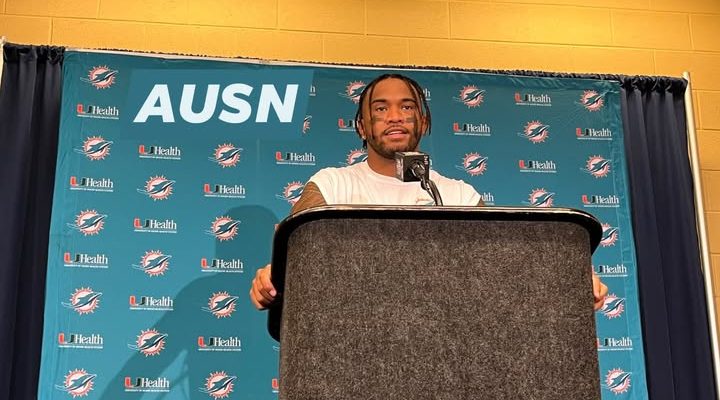Tua Tagovailoa’s reflections on the Miami Dolphins’ recent loss to the Indianapolis Colts reveal a thoughtful and measured approach to adversity. His comments show a quarterback keenly aware of the importance of balance when responding to defeat—not overreacting and not underreacting, but instead aiming to learn from the experience to avoid repeating the same mistakes. This mindset is crucial for any team looking to grow and improve over the course of a demanding NFL season.
When asked about the turnovers he committed during the game, Tua was candid and self-aware. He acknowledged the frustration that comes with giving the ball away but refused to frame it as pressing too hard. Instead, he described turnovers as an inherent part of the game—something that happens despite a player’s best intentions and efforts. This perspective highlights his ability to maintain composure under pressure, understanding that mistakes are inevitable but can be used as learning opportunities rather than sources of panic or blame. The quarterback’s maturity in handling errors is encouraging, especially since turnovers can significantly impact a team’s momentum and morale.
Tua’s comments also showed a deep sense of accountability and leadership. He emphasized that the fans don’t pay to watch a team score only eight points while the opposition racks up thirty. This statement underscores his commitment to delivering a competitive product on the field and his recognition of the responsibility that comes with representing not only his teammates but also the passionate Dolphins fanbase. His call for the team to “look in the mirror” and hold each other accountable speaks volumes about the culture he hopes to foster within the locker room—a culture where everyone owns their part in both the wins and the losses. This level of introspection and team accountability is often what separates good teams from great ones.
The way Tua spoke about the aftermath of the loss and the importance of the team’s process moving forward was particularly revealing. He expressed a curiosity about whether the players who showed up for film study and preparation last week would show the same level of commitment this week. This demonstrates his understanding that success in the NFL is about consistency and dedication to the details, not just talent or physical ability. Film study is a crucial part of a team’s preparation, and Tua’s comments suggest he’s looking for a culture where players take this seriously, where effort off the field matches effort on the field.
This kind of leadership, rooted in accountability, consistency, and resilience, is essential for a team dealing with the ups and downs of a long NFL season. Losses, especially those with lopsided scores, can be demoralizing. They can shake confidence and breed frustration. But Tua’s approach—acknowledging the reality of the defeat without getting lost in negativity or excuses—reflects a focus on solutions rather than problems. It’s about what the team can control moving forward, about building habits that prevent such losses from happening again.
The quarterback’s emphasis on not overreacting or underreacting is particularly important. Overreaction can lead to rash decisions, panic, and a lack of focus on fundamentals. Underreaction, on the other hand, risks complacency and ignoring serious issues that need to be addressed. By advocating for a measured response, Tua is advocating for a culture of thoughtful analysis and steady improvement. This kind of leadership can help stabilize a team during turbulent times and keep everyone aligned with a shared goal.
Moreover, Tua’s willingness to openly discuss his own mistakes, like turnovers, without deflecting blame or making excuses, sets an example for his teammates. It shows vulnerability but also strength—a readiness to accept responsibility and learn. This is a hallmark of great leadership in sports. Players look up to a quarterback who can admit errors and use them as fuel to get better. It fosters trust and respect within the team and encourages others to do the same.
His comments about the fan experience also highlight his awareness of the broader ecosystem around the team. Players often talk about the pressure of performing for fans, but Tua’s statement goes beyond just acknowledging that pressure; it’s a call to action. It’s a reminder that the team’s efforts are not just for themselves or their coaches but for the community that supports them. This connection between players and fans is vital, as fan support can be a huge boost during tough times. Knowing that the quarterback shares the fans’ frustration and desire for better performances helps build that bond.
In addition, Tua’s focus on process and preparation suggests he understands the long-term nature of building a successful team. One game, even a disappointing loss, is just a snapshot in a much larger journey. The real work happens every day in practice, in film sessions, and in meetings. If the team can maintain high standards in those areas, then the results on game day will eventually follow. This perspective is key in the NFL, where the season’s grind can wear on players mentally and physically.
By highlighting the importance of how players approach their process, Tua is implicitly encouraging professionalism and dedication. He’s holding teammates accountable not just in public but in their daily habits. This kind of leadership helps build a resilient team culture where everyone is pulling in the same direction, understanding that small details matter. It’s the little things that add up over a long season.
Furthermore, Tua’s measured tone and focus on accountability rather than blame or excuses helps keep the team’s morale intact. It’s easy for players and coaches to spiral into negativity after a bad loss, but Tua’s approach provides a stabilizing influence. It encourages a mindset of learning and growth rather than frustration and defeatism. That mindset is essential for bouncing back from losses and competing at a high level.
In summary, Tua Tagovailoa’s reflections after the loss to the Indianapolis Colts reveal a leader committed to balance, accountability, and continuous improvement. His ability to handle setbacks with a clear mind, to accept responsibility without self-flagellation, and to call on his teammates to uphold standards both on and off the field reflects the qualities needed to lead an NFL team successfully. His emphasis on not overreacting or underreacting, his candid discussion of turnovers as part of the game, and his call for mutual accountability within the team all point to a mature, thoughtful leadership style. Coupled with his awareness of the fans’ expectations and the importance of consistency in preparation, Tua’s approach sets a foundation for growth and resilience. While the loss was a tough one, his words suggest a team ready to learn from the experience and work harder to avoid similar outcomes in the future, aiming to provide better performances for their fans and ultimately achieve success together.



